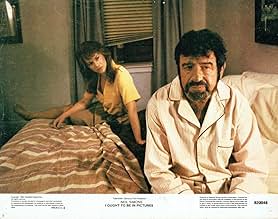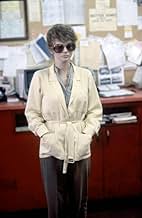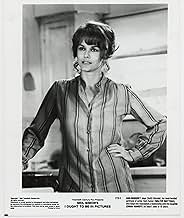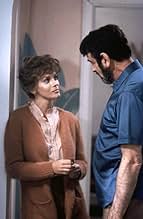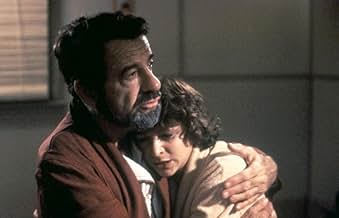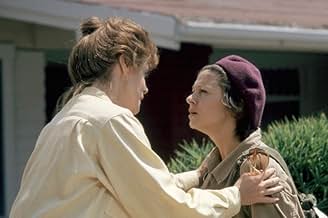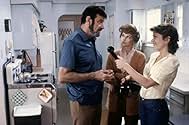PUNTUACIÓN EN IMDb
6,1/10
1,1 mil
TU PUNTUACIÓN
La abuela no tiene nada que decir cuando Libby le cuenta que se va a Los Ángeles a buscar a papá, un guionista. La abuela lleva seis años en un cementerio de Nueva York y papá ha estado fuer... Leer todoLa abuela no tiene nada que decir cuando Libby le cuenta que se va a Los Ángeles a buscar a papá, un guionista. La abuela lleva seis años en un cementerio de Nueva York y papá ha estado fuera de la vida de Libby 16 de sus 19 años.La abuela no tiene nada que decir cuando Libby le cuenta que se va a Los Ángeles a buscar a papá, un guionista. La abuela lleva seis años en un cementerio de Nueva York y papá ha estado fuera de la vida de Libby 16 de sus 19 años.
Argumento
¿Sabías que...?
- CuriosidadesWalter Matthau once said of this movie: "It's filled with very real emotions . . . there were a few seconds while I was acting when I flashed back to my childhood when my father deserted us . . . I was exhausted at the end of each day. Some roles are easier but comedy, such as Neil Simon writes, is twenty times more difficult than straight acting or tragic acting. I prefer the challenge of comedy. It requires a great deal more energy, a great deal of kinetic output."
- PifiasIn the closing scenes Libby is first seen sitting on the left side of the bus talking to her seat mate, then when Herb drives his car up next to the bus on the right side she sees him through the right side window.
- Banda sonoraOne Hello
Music & Lyrics by Marvin Hamlisch and Carole Bayer Sager
Sung by Randy Crawford
Produced by Tommy LiPuma
(P) 1982 WEA International Inc.
Reseña destacada
Neil Simon's "I Ought to Be in Pictures" is a moving family drama, peppered with the author's patented gag lines and notable for sock performances by Dinah Manoff and Walter Matthau. Affecting, amusing interpersonal relationship pic bodes broad market appeal.,
Nimbly opened out from the 1980 stage version by helmer Herbert Ross (who also staged the play), film concerns a 19-year-old spunky Brooklyn girl Libby (Dinah Manoff reprising her stage role), who hitchhikes to New York to break into films as an actress but more importantly see her dad who left her, a brother and mom for good 16 years earlier. Dad is Herb Tucker (Walter Matthau fitted out with a handsome beard), a once-successful feature and tv scripter now given over to gambling and drinking. Tucker's loyal g.f. Steffie (Ann-Margret) is supportive but has her own children to take care of and a new boyfriend in the wings.
With Libby gradually insinuating herself into Herb's life and gradually reforming him (while cutely refurbishing his house and Mustang car), film gains its force from the powerful interplay of the duo's personalities. When the comical putdowns are replaced by genuine emotional (and physical) contact, Simon achieves his tear-jerking goal.
Key factor in making this work is apt casting, with Manoff, Lee Grant's sprig. Outstanding in avoiding direct sentimentality in the showy central role. She's also a good listener, with her eye contact and support of Matthau key elements. For his part, Matthau makes a ne'er-do-well character immensely sympathetic in spite of his shortcomings, enough so the viewer can root for these two to eventually come together in a loving fashion. Echoing the mother-daughter reconciliation of SImon's recent "Only When I Laugh", it builds to a valid denouement of Matthau geared up to plunge seriously into his writing assignments, and Manoff returning home with her family devils exorcised.
In a much smaller role, a deglamorized Ann-Margret is effective as the selfless mistress, while Martin Ferrero, Lewis Smith and Lance Guest provide a diveting scene apiece opposite Manoff. Tech credits, particularly Albert Brenner's production design and David M. Walsh's lighting, succeed in giving the film a realistic backdrop and avoiding a stagey or studio set look.
My review was written in March 1982 after a Midtown Manhattan screening.
With Libby gradually insinuating herself into Herb's life and gradually reforming him (while cutely refurbishing his house and Mustang car), film gains its force from the powerful interplay of the duo's personalities. When the comical putdowns are replaced by genuine emotional (and physical) contact, Simon achieves his tear-jerking goal.
Key factor in making this work is apt casting, with Manoff, Lee Grant's sprig. Outstanding in avoiding direct sentimentality in the showy central role. She's also a good listener, with her eye contact and support of Matthau key elements. For his part, Matthau makes a ne'er-do-well character immensely sympathetic in spite of his shortcomings, enough so the viewer can root for these two to eventually come together in a loving fashion. Echoing the mother-daughter reconciliation of SImon's recent "Only When I Laugh", it builds to a valid denouement of Matthau geared up to plunge seriously into his writing assignments, and Manoff returning home with her family devils exorcised.
In a much smaller role, a deglamorized Ann-Margret is effective as the selfless mistress, while Martin Ferrero, Lewis Smith and Lance Guest provide a diveting scene apiece opposite Manoff. Tech credits, particularly Albert Brenner's production design and David M. Walsh's lighting, succeed in giving the film a realistic backdrop and avoiding a stagey or studio set look.
My review was written in March 1982 after a Midtown Manhattan screening.
- lor_
- 12 ene 2023
- Enlace permanente
Selecciones populares
Inicia sesión para calificar y añadir a tu lista para recibir recomendaciones personalizadas
- How long is I Ought to Be in Pictures?Con tecnología de Alexa
Detalles
- Fecha de lanzamiento
- País de origen
- Idiomas
- Títulos en diferentes países
- I Ought to Be in Pictures
- Localizaciones del rodaje
- 6830 Sunset Boulevard, Hollywood, California, Estados Unidos(motel Libby stays at upon arrival in Hollywood)
- Empresa productora
- Ver más compañías en los créditos en IMDbPro
Taquilla
- Presupuesto
- 10.500.000 US$ (estimación)
- Recaudación en Estados Unidos y Canadá
- 6.968.359 US$
- Fin de semana de estreno en EE. UU. y Canadá
- 2.170.397 US$
- 28 mar 1982
- Recaudación en todo el mundo
- 6.968.359 US$
Contribuir a esta página
Sugerir un cambio o añadir el contenido que falta

Principal laguna de datos
By what name was Soy tu hija, ¿te acuerdas? (1982) officially released in Canada in English?
Responde

